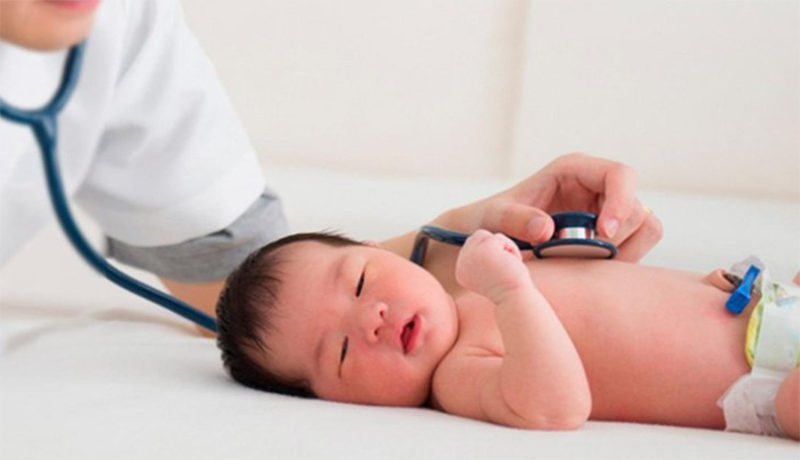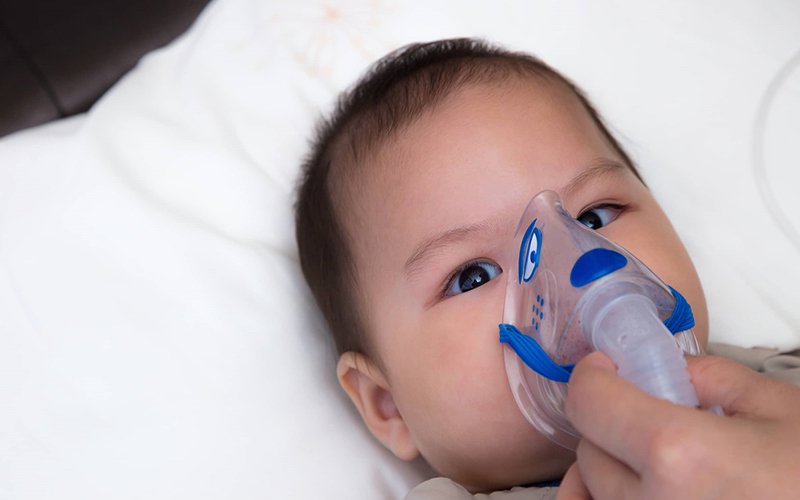What to do with a child's wheezing?
Wheezing in infants and young children is a very common respiratory symptom. Most wheezing sounds are heard when a child breathes out, but wheezing can also occur when a child breathes in. This symptom needs to be distinguished from the sound of breathing when a child has a stuffy nose due to a cough or flu.
1. What is infant wheezing?
Wheezing in infants and young children is a very common respiratory symptom, usually seen in children under 3 years of age. Wheezing is a sound akin to snoring, which can be heard with the ear (close to the ear) or with a stethoscope. Most wheezing sounds are heard when a child breathes out, but wheezing can also occur when a child breathes in. This symptom needs to be distinguished from the sound of breathing when the child has a stuffy nose due to a cough, cold, flu, ... because wheezing can be a symptom of a respiratory disease.

Khò khè có thể nghe trực tiếp bằng tai hoặc dùng ống nghe
2. Causes of wheezing in babies
Wheezing in infants and young children can be caused by narrowing or blocked airways. The airway here is the passage from the trachea in the chest to the bronchi, also known as the lower respiratory tract. Depending on the location of the narrowing and obstruction, the degree of wheezing in children will vary.
Here are some common causes of wheezing in young children:
Bronchiolitis, pneumonia : Mostly due to respiratory syncytial virus (RSV) which causes inflammation of the branches of the bronchi in the airways below, leading to wheezing in infants, especially those under 6 months of age. Asthma, bronchial asthma: This is the main cause of wheezing in children, mainly children over 18 months old. In addition, there are uncommon causes such as:
Children inhale or swallow foreign objects that cause airway obstruction. Children with birth defects in the bronchi, larynx. At this time, the child may have wheezing for a long time. Children with gastroesophageal reflux disease.

Đường thở bị hẹp sẽ dẫn đến tình trạng khò khè ở trẻ
3. Baby wheezing what to do?
Although wheezing is a very common respiratory symptom in young children, however, parents should not ignore it, because it is possible that the child is having breathing problems. Therefore, when a child wheezes and has difficulty breathing, parents should take the child to a medical facility or hospital to be examined by a specialist doctor to determine the cause, and then have the appropriate treatment. Children should be taken to the doctor if:
The child is under 3 months old, as soon as the child is found to be wheezing. Children with wheezing accompanied by symptoms such as purple lips, cough, shortness of breath or rapid breathing, crying inaudibly, chest tightness, restlessness, lethargy. The child has persistent and recurrent wheezing for more than 4 weeks in a row. In addition, parents should note, do not arbitrarily buy and give children medicine without a doctor's prescription, because it can make children wheeze more difficult to breathe.
If a child's wheezing is caused by a cold or the weather, parents can apply the following natural remedies to clear their child's airways and reduce wheezing symptoms:
Use ginger mixed with warm or cold water , or mixed with other ingredients such as honey, pomegranate, fenugreek to drink. Rub the baby's back and chest with mustard oil, let the child inhale eucalyptus oil or onion, bulb. Drink the juice of figs that are soaked overnight. Drink honey with warm water, lemon juice or with cinnamon powder. However, the above methods should be noted for infants, for example honey can be toxic in babies. To reduce the symptoms of wheezing, difficulty breathing due to stuffy nose when having a cold, parents need to pay attention to add water, milk, and increase green vegetables and fruits for children.
Most children with wheezing and difficulty breathing can be cured if they are examined as soon as they are detected, the cause is identified and the doctor's treatment is followed.
In addition, parents should also add some supporting foods containing lysine ingredients, essential micro-minerals and vitamins such as zinc, chromium, selenium, B vitamins, ... to help fully meet The need for nutrients at the same time supports the immune system, enhances resistance, reduces the risk of upper respiratory tract infections, bronchitis, flu.
Lysine is very necessary for the development of children, Lysine promotes the production of digestive enzymes to stimulate children to eat better and digest easily and effectively, increase food metabolism, maximize absorption of nutrients. Nutrition from food.Strengthening lysine for babies helps the body create antibodies, develop resistance to help reduce cough, thin phlegm in children.
Parents can learn more:
Why do you need to supplement Lysine for your baby?
Please regularly visit Vinmec.com website and update useful information to take care of your baby and family.
Bài viết này được viết cho người đọc tại Sài Gòn, Hà Nội, Hồ Chí Minh, Phú Quốc, Nha Trang, Hạ Long, Hải Phòng, Đà Nẵng.






